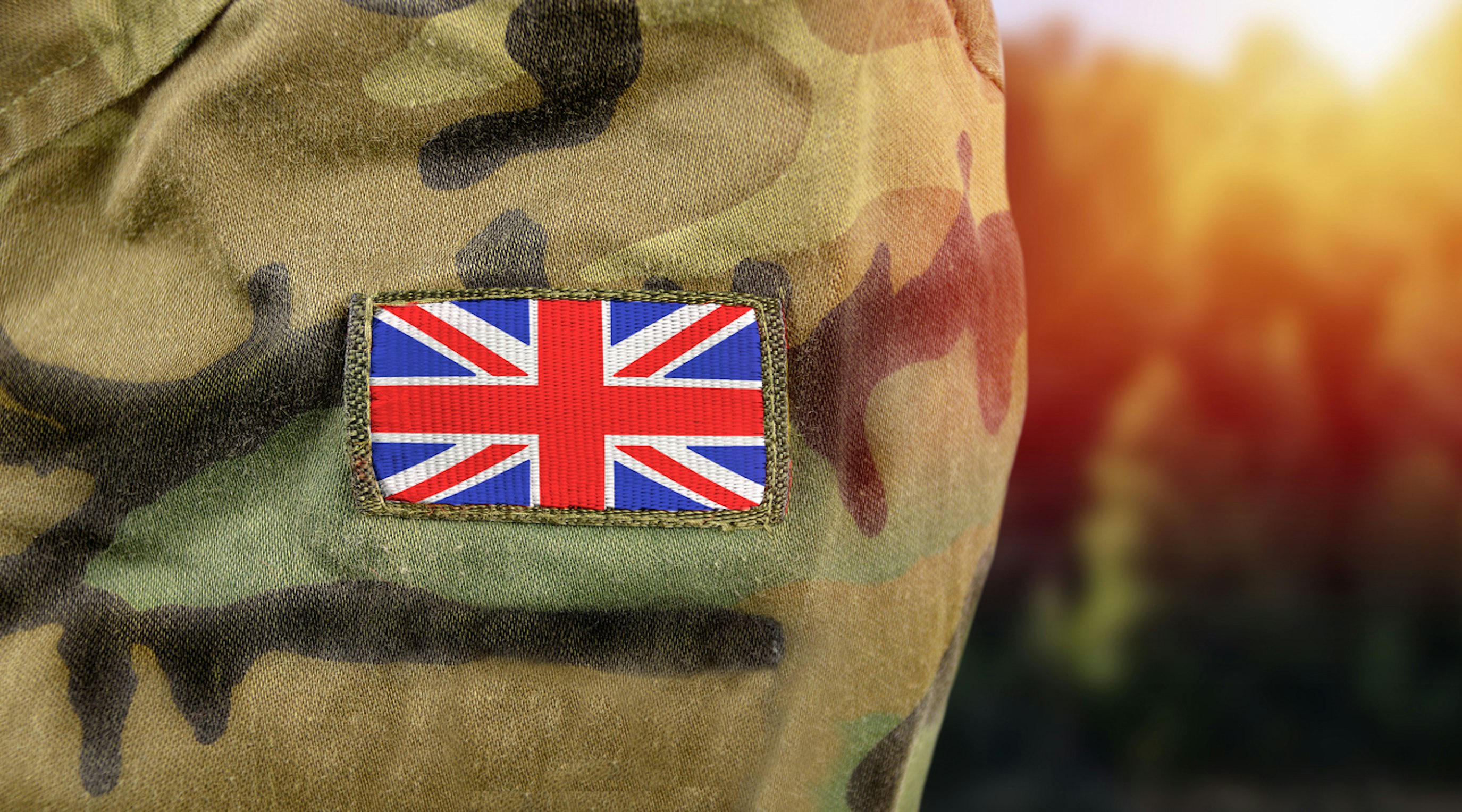Armed Forces Day: Medical cannabis, veterans and PTSD
12 min read
Sarah Sinclair
With those deployed in the Armed Forces at greater risk of experiencing mental health conditions such as PTSD, we explore the potential benefits of medical cannabis treatment among the veteran community.
Contents
Armed Forces Day, on Saturday 29 June, is the culmination of a week of celebrations paying tribute to the men and women who make up the Armed Forces community, providing a valued morale boost for serving personnel, veterans, and their families.
It also happens to coincide with Wellbeing Week (24 - 30 June) and PTSD Awareness Day on 27th June, so we’re taking the opportunity to highlight the role medical cannabis can play in the emotional and mental wellbeing of veterans in the UK.
Veterans in the UK
According to the Office for National Statistics, there are around 2.4 million veterans in the UK. This includes anyone who has served in the Armed Forces at any time and Armed Forces Day celebrates their continued role within the military community.
From Monday 24 June, events will be held by organisations and communities across the UK, who have committed to supporting Armed Forces personnel past and present by signing up to the Armed Forces Covenant.
The Armed Forces Covenant was adopted under the Armed Forces Act 2011 and is a commitment from ‘government, businesses, local authorities, charities, and the public’ to support current and former members of the Armed Forces and their families.
Veterans’ health
Many veterans experience physical and mental health issues, which may or may not be related to their time serving in the Armed Forces.
Research from 2015, comparing UK Service personnel and the English working general population suggests that the odds of experiencing a common mental health disorder were double in the military compared to the general population.
In an NHS England survey of 3,000 veterans, more than half of respondents (52%) said they currently had, or had previously had, a mental health problem and 54% said they had a physical health problem now or had previously had one. UK government data published in 2022, also suggests that rates of mental disorders seen in military healthcare services have risen since 2020/21.
Based on the 2021 Census, a greater proportion of veterans than non-veterans who identified as gay or lesbian, bisexual, or another minority sexual orientation said their health was bad or very bad and were disabled.
However, for a variety of reasons many veterans do not seek help, even though they may be experiencing mental health problems.
Veterans and post-traumatic stress disorder (PTSD)
What is PTSD?
The NHS describes PTSD as a mental health condition caused by “very stressful, frightening or distressing events”. Any situation that a person finds traumatic can cause PTSD.
PTSD is estimated to affect about one in every three people who have a traumatic experience. It may develop immediately after an event, or it can occur weeks, months or even years later.
Some people are diagnosed with complex post-traumatic stress disorder (cPTSD). This tends to present in those who have repeatedly experienced traumatic situations, such as severe neglect, abuse or violence.
Complex PTSD can cause similar symptoms to PTSD and may not develop until years after the event.
Symptoms of PTSD
PTSD can affect people in different ways, but symptoms are often severe enough to have a significant impact on daily life.
Some of the common symptoms include:
- Re-experiencing the event through nightmares and flashbacks
- Avoidance and ‘emotional numbing’ which can lead to isolation
- Hyperarousal which can lead to irritability, angry outbursts, sleeping problems and difficulty concentrating
- Other mental health problems, such as depression, anxiety or phobias
- Self-harming or destructive behaviour, such as drug and alcohol misuse
- Physical symptoms, such as headaches, dizziness, chest pains and stomach aches
How is PTSD treated?
Currently, the main treatments for PTSD are talking therapies and prescribed medications such as antidepressants.
A doctor will usually carry out a detailed assessment of the patient and they may begin a process known as ‘active monitoring’ to monitor symptoms over a period of time.
There are currently only two medicines recommended for prescription in PTSD, both of which are selective serotonin reuptake inhibitors (SSRIs).
The main types of therapies used to treat PTSD are:
- Cognitive behavioural therapy (CBT) - a talking therapy that aims to help you manage problems by changing how you think and act.
- Eye movement desensitisation and reprocessing (EMDR) - a psychological treatment which involves recalling the traumatic incident in detail while making eye movements.
How prevalent is PTSD among veterans?
Military personnel who are deployed are at a high risk of experiencing traumatic events and research from the UK has found an association between holding a combat role and PTSD.
In 2018, a study by researchers at King's College London revealed for the first time that rates of PTSD among veterans were higher than that of the general public.
According to the study, which was published in the British Journal of Psychiatry the rate of PTSD among UK veterans of all conflicts was 7.4%, compared to a rate of 4% among the general public.
Medical cannabis and PTSD
Cannabis-based medicines are increasingly being prescribed for conditions such as PTSD.
In the UK, PTSD is one of the most common psychiatric conditions for which medical cannabis is prescribed, following anxiety.
Notably, Ukraine legalised medical cannabis at the end of 2023, following calls from activists and political leaders around its potential to help treat PTSD and other mental health issues resulting from the war with Russia.
Medical cannabis and PTSD: What does science say?
The evidence base for the use of cannabis in the treatment of PTSD is limited but growing.
Real-world data from patients in the UK overwhelmingly supports its use for symptom reduction and quality of life. According to the researchers at Drug Science PTSD symptoms significantly reduced among T21 participants, three months after starting treatment with cannabis-based medicines.
An earlier study published in the Expert Review of Neurotherapeutics found that patients enrolled on the UK Medical Cannabis Registry experienced an improvement in PTSD-specific symptoms, general health-related quality of life, sleep, and anxiety outcomes at a six month follow-up.
Meanwhile, a longitudinal study involving 150 participants in the US, found that participants who accessed cannabis had more than double the likelihood of no longer meeting PTSD criteria by the end of the study.
The role of the endocannabinoid system in PTSD
Although much of the research so far has been based on real-world data, clinical studies have demonstrated the role of the endocannabinoid system in PTSD. This may explain why cannabinoids can be a potentially helpful treatment.
PTSD is linked to increased availability of CB1 receptors, which are responsible for regulating sleep and anxiety.
THC also reduces activity in the amygdala (the part of the brain that governs fear response), with research suggesting that it may help regulate the threat response in trauma-related conditions.
It is also thought to reduce REM sleep, which causes intense dreams, making it helpful for patients experiencing nightmares, intrusive thoughts and flashbacks as a result of PTSD.
Benefits of medical cannabis for veterans
Research suggests that the use of cannabis medicinally may not be uncommon among the veteran community.
In 2021, a team of researchers from the University of Illinois studied cannabis consumption in more than 500 veterans aged 60 and above. Compared to non-veterans of similar ages, those in the study were more likely to report using cannabis for the treatment of mental health conditions, such as post-traumatic stress, anxiety, and insomnia.
In a separate survey of US military veterans, medicinal cannabis was found to improve quality of life and reduce unwanted use of other substances, including alcohol and other prescription medications.
The Sleep Wake Awareness Programme (SWAP) in Canada, has treated over 6,000 veterans.
Speaking at the cannabis science conference CT-CANN23 last year, programme director Dr Celeste Thirwell shared how in a pilot study including 22 veterans, PTSD scores reduced from an average of 67.9 to 34.5 (a score of 50 is considered significant for PTSD).
They also reported improvements in sleep, anxiety and chronic pain and the number of daily medications that patients were taking also reduced from an average of eight to an average of three.
However, the first randomised placebo-controlled study trial of smoked cannabis for military veterans with PTSD produced inconclusive results. While the study found short-term use is associated with ‘significant improvements’ in symptoms, there was no marked difference between the high dose treatments and the placebo.
FAQs
Is medical cannabis effective for veterans with PTSD?
Medical cannabis shows promise for veterans with PTSD by alleviating anxiety, improving sleep, and stabilising mood. While one of the newer treatment options available in the UK, it has been used in some countries for decades, and an increasing number of veterans are turning to medical cannabis in place of (or to complement) traditional treatments.
How does CBD differ from THC in treating PTSD?
CBD calms anxiety, decreases inflammation, and improves sleep without the psychoactive effects of THC. THC has been shown to help with intrusive thoughts and hyper-arousal but can also cause anxiety for some at higher doses. A balanced ratio of THC and CBD often works best for PTSD patients.
What cannabinoids are best for PTSD?
That depends on the symptoms being targeted. THC can help reduce nightmares, flashbacks, and promotes deeper sleep, while CBD eases anxiety and enhances relaxation. Other minor cannabinoids, like CBN, may aid sleep, but always consult with a medical professional to determine the best course of treatment for your individual needs.
Further resources for veterans
A number of charities and organisations provide support and advice for veterans struggling with their mental health.
The UK’s leading mental health charity for veterans. Contact: 0800 138 1619, text 07537 404 719 or email helpline@combatstress.org.uk
For veterans needing urgent help in a crisis. Freephone (UK only): 0808 1914 2 18, Telephone (overseas): +44 1253 866 043, Email: veterans-uk@mod.gov.uk
Provides support for veterans to ‘come out of the darkness’ and reduce the negative impact of social isolation and loneliness.
Supports the health and wellbeing of LGBT+ Veterans, service personnel and their families.
Other charities and resources:
- The Royal British Legion
- Veterans’ Gateway
- Help for Heroes
- The Confederation of Service Charities (Cobseo)
Getting medical cannabis on prescription for PTSD
If you have a diagnosis of PTSD and previous treatments haven’t effectively managed the symptoms you may be eligible for a medical cannabis prescription. You can use Releaf’s free eligibility checker to determine if it's right for you.
A team of expert clinicians will then review your application and if appropriate you will be invited to schedule an appointment with a specialist consultant.
Find out more via the FAQs page or by contacting a member of the team.
Share article
Did you like this article?
It is important to seek medical advice before starting any new treatments. The patient advisors at Releaf are available to provide expert advice and support. Alternatively, click here to book a consultation with one of our specialist doctors.
Elevate your wellness with medical cannabis
Get comprehensive care, convenience, and confidence with an all-in-one treatment plan.
Am I eligible?Authors
Sarah, a distinguished journalist with over a decade in publishing and communications, now excels in cannabis health and policy journalism in the UK, advocating for informed health decisions through her award-winning work.
Editorial Policy
All of our articles are written by medical cannabis experts, guided by strict sourcing guidelines, and reference peer-reviewed studies and credible academic research. Our expert clinical team and compliance specialists provide valuable insights to ensure accuracy when required. Learn more in our editorial policy.
Need more help?










